Xi arrives in Phnom Penh for state visit to Cambodia
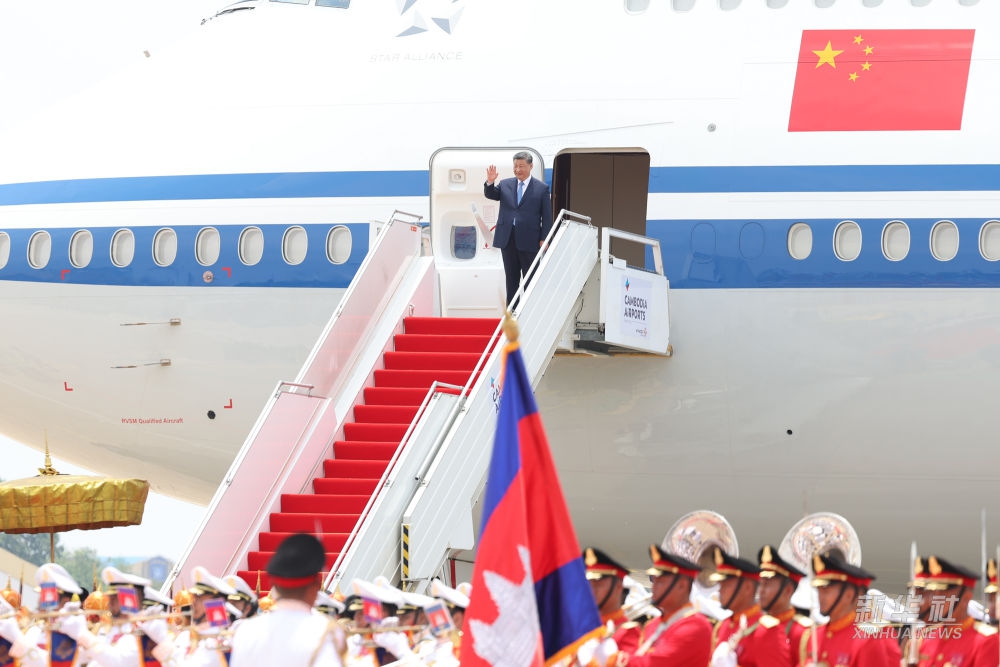
Chinese President Xi Jinping on Thursday arrived in Phnom Penh for a state visit to Cambodia.

Chinese President Xi Jinping on Thursday arrived in Phnom Penh for a state visit to Cambodia.
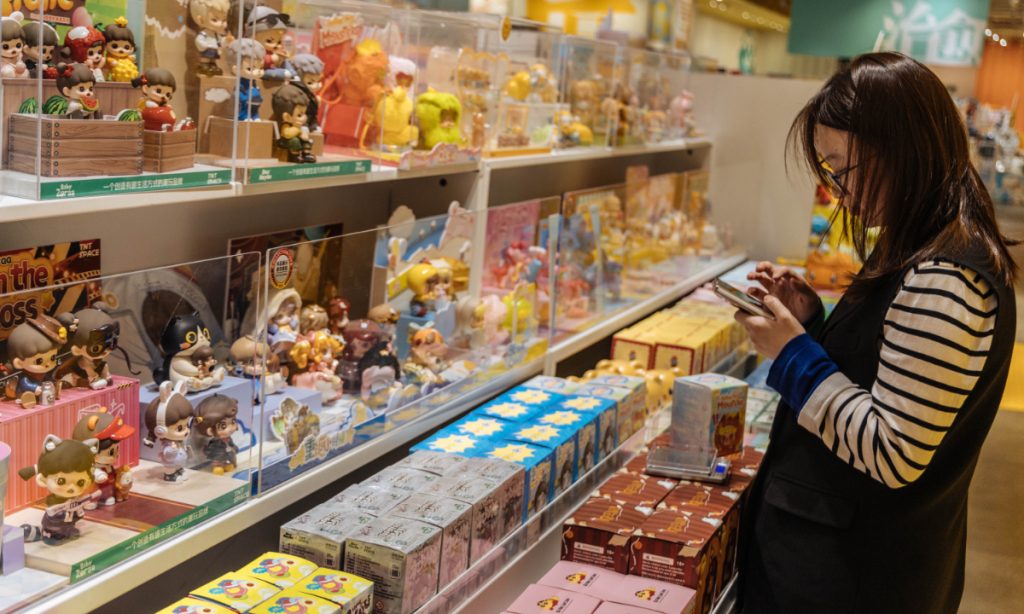
Cradling the blind box in her hand, Yang Hailun gave it a gentle shake, hoping the faint clatter inside might offer a clue to the surprise sealed within.
Eventually, she picked this one and headed to the store’s counter to pay.
When she unveils a Minnie Mouse figurine – her top pick – she’s all smiles, ready to hunt for more.
Yang, a Beijing resident born in the 1990s, often meets her friends at various shopping malls after work or on weekends.
Besides dining out, she and her companions are avid visitors of stores that sell blind boxes, anime figurines, and collectible cards. These types of shops are becoming increasingly popular in Chinese malls.
“Whether it’s for my favorite cartoon characters or a pretty design, I’ll pay for it,” Yang told the Global Times. “I display them at home or in the office as decorations. Seeing them makes me happy.”
Today in China, for many consumers like Yang, spending money for the sake of such “happiness” has become routine. Trendy blind boxes and anime figurines now decorate office desks, bringing joy to young people.
This type of consumption – driven by psychological experience and the need to satisfy emotional desires – is known as emotional consumption. According to a latest study released by the China Consumers Association (CCA), emotional release is becoming a major factor influencing the purchasing decisions of the younger generation, the Xinhua News Agency reported in March.
Data from multiple research institutions shows that China has nearly 500 million users who engage with ACG (animation, comics, and games) content. The “ACG-style” consumption market exceeds 100 billion yuan ($13.8 billion) in size, Economic Information Daily reported in July 2024.
Young people are the most dynamic driving force in the market as the core consumer base ranges from those born in the 1980s and 1990s to those born after 2000 and even 2010, according to the Economic Information Daily.
This trend not only draws back large numbers of emotionally driven consumers, but has also introduced a new concept of consumption and kept shopping malls lively.
Value of emotion
An annual report released by CCA in May 2024 said a new phenomenon was emerging in China’s consumer market, where people are spending money in pursuit of emotional or psychological satisfaction, the China News Service reported.
The report cited several examples: the overwhelming popularity of certain tourist destinations, a surge in live performance attendance with fans traveling across cities, the resurgence of some domestic brands, and the continued rise of interest in Hanfu, traditional Chinese clothing. These booming consumption trends, it noted, are largely driven by a desire for emotional comfort and spiritual joy in specific scenarios.
In shopping malls in several cities across China, the Global Times reporters found that many popular products on the market today are especially attuned to expressing the emotions young people experience in their life.
For instance, plushie toys featuring capybaras occupy prominent spots in many stores. In recent years, the image of the capybara has gone viral across China. To local consumers, this South American mammal, known for its calm and gentle demeanor, has come to symbolize an ideal laid-back lifestyle.
Another popular franchise, LiPU Friends, which could be described as a cartoon version of the film Office Space starring small animals and a carrot, has also won over young consumers in 2025 with its blind boxes and related merchandise. Its appeal lies in the way it captures a range of workplace states many can relate to – confusion, exhaustion, anxiety, and, at times, a sense of fulfillment.
“The prevalence of emotional consumption reflects a new value system centered around experiential feelings, which transcends the level of basic needs and emphasizes deriving satisfaction from emotions and sensations,” Zhang Yiwu, a professor at Peking University, told the Global Times on Wednesday, noting that once material needs are met, people increasingly prioritize emotional experiences and personal pleasure, making this a broad consumer trend.
“Moreover, emotional consumption has influenced traditional consumption models, driving the market toward a greater emphasis on emotional connections and experiential consumption,” Zhang said.
New trends on the block
In recent years, the retail landscape of shopping malls across China has undergone a notable transformation. The traditional model, once dominated by clothing stores and dining outlets, is gradually being reshaped by a wave of distinctive specialty retailers.
These include chains such as Pop Mart, known for its original IP-based designer toys, Miniso, which offers merchandise from well-known franchises such as Disney, Pokémon, My Little Pony, and the current popular film Ne Zha 2, and the “goods” stores, which specialize in ACG merchandise.
These stores not only diversify product offerings in malls but also draw large foot traffic –particularly among younger consumers – through unique and immersive shopping experiences.
After picking out an acrylic stand figure of a favorite character at an ACG store in East China’s Shanghai, 24-year-old Lin Yi would instinctively pose with it in front of the store’s intricately designed display wall for social media – a ritual that has become second nature to her and many of her peers.
“I used to think visiting malls was a waste of time because most shops sold the same clothes,” Lin said. “But when my friend told me about these anime-themed specialty stores popping up in local malls, reminiscent of Akihabara in Tokyo, I went out of curiosity. Now, it’s my go-to weekend activity.”
This influx of young consumers has also significantly revitalized some commercial districts.
According to China News Service, an old shopping mall in Beijing’s Wangfujing area, which closed in 2020, was relaunched in 2023 with a new identity as a “New Chinese Style Shopping Center,” aiming to better resonate with younger shoppers.
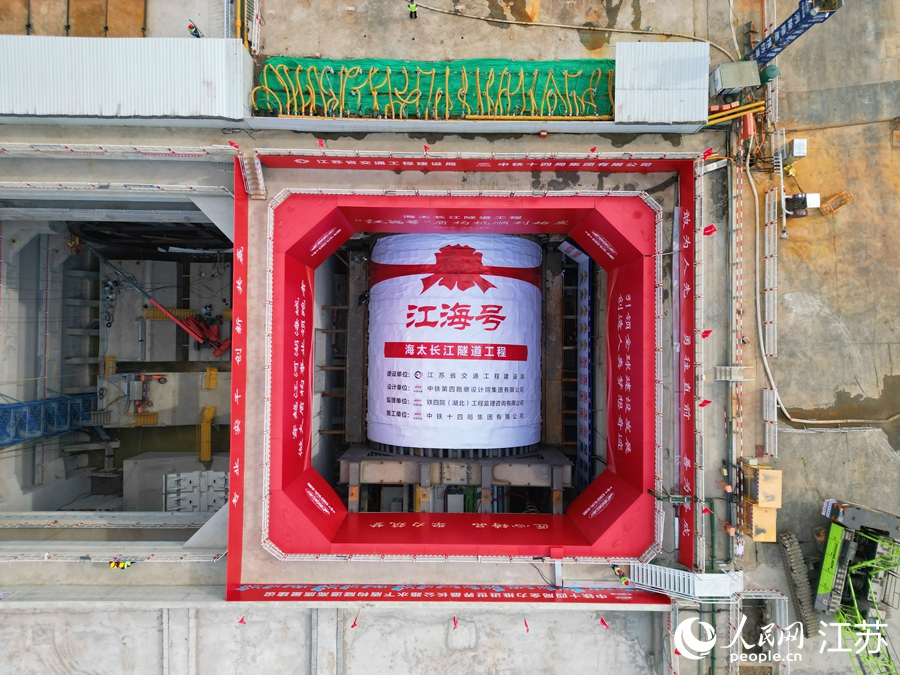
China on Wednesday deployed a giant self-developed tunnel boring machine (TBM) for the construction of the world's longest underwater highway TBM tunnel.
The new machine, named "Jianghai," has a maximum excavation diameter of 16.6 meters. It is approximately 145 meters long and weighs an impressive 5,000 tonnes.
The machine is used in the construction of the Haitai Yangtze River Tunnel in east China's Jiangsu Province. The tunnel is a key project to forge a major trans-river road link under China's longest river, connecting Haimen in the city of Nantong with Taicang in the city of Suzhou.
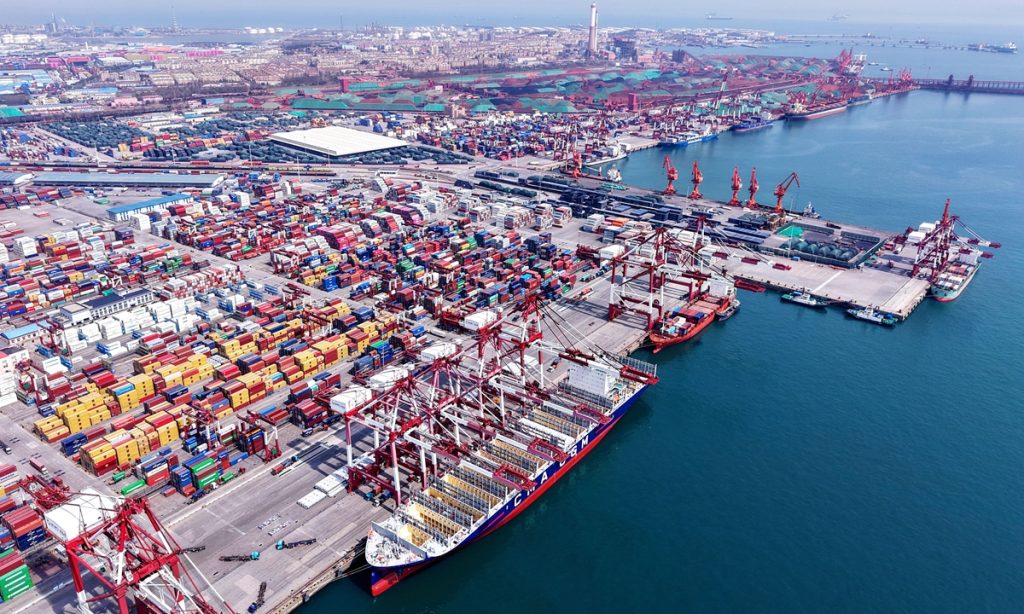
Following the US' imposition of 104-percent tariffs on Chinese goods, China responded with a raft of measures on Wednesday, including lifting the additional tariffs on products imported from the US to 84 percent, and adding a number of US companies to its export control list and unreliable entity list.
China will lift the additional tariffs on products imported from the United States to 84 percent, effective from 12:01 p.m. Thursday, the Customs Tariff Commission of the State Council announced Wednesday. The announcement follows the US decision to raise the "reciprocal tariffs" on Chinese imports from 34 percent to 84 percent, a move that is "going further down the wrong path and seriously infringes on China's legitimate rights and interests," according to the commission, Xinhua reported.
Measures announced on late Wednesday also include an addition of 12 US entities to the country's export control list and 6 US firms to the unreliable entity list and filing a lawsuit over the latest US tariff hikes at the WTO, according to Xinhua News Agency.
China's Ministry of Culture and Tourism on Wednesday issued a risk alert for Chinese tourists traveling to the US on its official website, citing the recent deterioration in China-US economic and trade relations as well as the domestic security situation in the US. The ministry urged Chinese travelers to carefully assess the risks and exercise caution when planning trips to the US.
China's Ministry of Education issued the first study abroad alert for 2025 on Wednesday. According to the ministry, the state of Ohio in US has recently passed a bill on higher education that contains negative clauses related to China and imposes restrictions on educational exchanges and cooperation between colleges and universities in China and the US. The Ministry of Education reminds all students to make a good security risk assessment and enhance their awareness of precaution when choosing to study in the relevant states in the US in the near future.
Resolute response
The prompt and multi-pronged response from China to the latest US tariff hike underscores China's firm stance against US trade protectionism and unilateralism, as well as China's resolute determination to uphold the fundamental principles of the multilateral trading system and protect its own development interests, a Chinese expert said on Wednesday.
"The Chinese people have never been intimidated by coercion or cowed by pressure," Cui Fan, a professor from the University of International Business and Economics, told the Global Times on Wednesday. The expert noted that "China is committed to deepening reform and high-level opening-up, and stands ready to collaborate with all countries to jointly advance the development of an inclusive and mutually beneficial economic globalization."
Earlier in the day, China stated its position on China-US trade and economic relations in a white paper, titled China's Position on Some Issues concerning China-US Economic and Trade Relations, noting that the relations are mutually beneficial and two sides can resolve differences through equal-footed dialogue.
The white paper clarified facts about the ties between the world's two largest economies and made clear China's stance on relevant matters, according to Xinhua. It said China-US economic and trade relations are mutually beneficial and win-win in nature, and cooperation benefits both sides while confrontation harms both. It said that China has scrupulously honored the Phase One Economic and Trade Agreement while the US side has failed to meet its obligations.
The document, released by the State Council Information Office, stressed that China upholds the principle of free trade and strictly complies with WTO Rules, and that unilateralism and protectionism undermine China-US economic and trade relations.
Altogether, imports from 86 countries were now subject to higher tariffs ranging from 11 percent to 84 percent. China is being hit with a new 84 percent tariff, as part of an overall tariff rate of 104 percent on its exported goods to the US, according to CNBC.
When responding to media inquiries on the US' 104 percent tariffs on Chinese goods, Chinese Foreign Ministry spokesperson Lin Jian said on Wednesday that "We will not let anyone take away the Chinese people's legitimate right to development. We will not tolerate any attempt to harm China's sovereignty, security and development interests. We will continue to take resolute and strong measures to safeguard our legitimate rights and interests."
Regarding the white paper, China's Ministry of Commerce also said on Wednesday that with firm will and abundant means, China will resolutely take countermeasures and fight to the end if the US insists on further escalating economic and trade restrictive measures.
Resilience and strength
China's response to the US unwarranted tariffs, including the over 20 countermeasures taken so far, is reasonable and justified, a Chinese expert said.
Zhou Mi, a senior research fellow at the Chinese Academy of International Trade and Economic Cooperation, told the Global Times that the sweeping US tariffs - targeting not just China but many trade partners - are tightening supply chains and creating instability in key sectors.
"We're already seeing earlier signs of the impending chaos caused by the tariffs, such as shortages of everyday goods like eggs in the US and consumers' stockpiling of goods," Zhou noted. "The American people have already started paying the price for the trade and tariff war launched by the US government. Corporations based in the US will be the next in line to face the chaos of higher costs and logistical disruptions, inflation and recession fears."
The expert believes that as US' tariff abuse pushes the world into more uncertainty, China is in better positioned to navigate the quagmire created by the global trade war initiated by the US, while the US may face serious backlash due to the economic damage it has inflicted upon itself.
Despite that the Chinese economy will also face pressure caused by US steep tariffs, experts interviewed by the Global Times on Wednesday have confidence that the Chinese economy is prepared to deal with the challenges brought by tariffs impact.
Zhou said China's exports sector will face pressure, however, the country has built a resilient manufacturing base and is capable of adapting, which is the most desired quality in times of turbulences and challenges.
Wang Huiyao, founder and president of the Center for China and Globalization, said that as the US launches a global trade war, the rest of the countries in the world are in the same boat.
"The current global trade chaos could be an opportunity for China to further play its role as the anchor of stability in safeguarding the multilateral trading system and global trade, as well as a chance to deepen regional economic integration with like-minded countries," Wang said.
Internationally, the US' tariffs continue to draw wide criticism and countermeasures from its trading partners.
The European Union on Wednesday approved its first set of retaliatory measures to counter tariffs imposed by the US on steel and aluminum, CNBC reported.
The US tariff policy is met with opposition from within the US. According to the Pew Research Centre poll released on Tuesday, a majority of Americans surveyed said US levies on China in particular will be bad for the US (52%), according to USA Today.
A separate poll, conducted by Reuters/Ipsos, showed that 73 percent of Americans expect price surge under current government's tariffs.
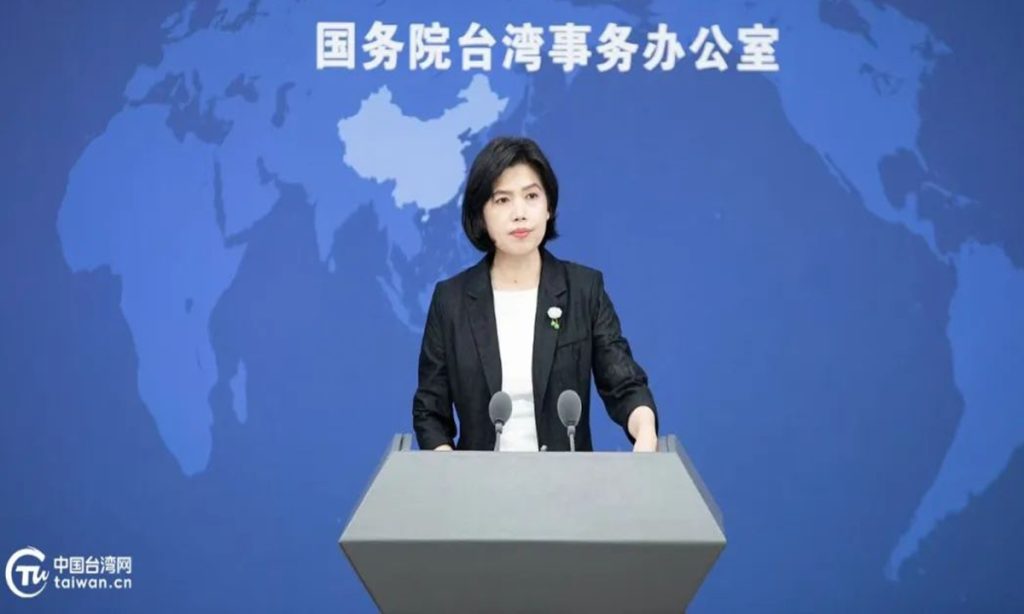
When asked for comment regarding the Democratic Progressive Party (DPP) authorities' suppression and revocation of the residency permits of two spouses from the Chinese mainland, using excuse of their remarks advocating for "unification by force," Zhu Fenglian, spokesperson for the Taiwan Affairs Office of the State Council, said on Tuesday that this is yet another case of trampling on the fundamental rights of cross-Straits couples by the DPP authorities. She described it as another malicious act of creating green terror and a chilling effect within the island of Taiwan, which escalates cross-Straits confrontation.
Zhu stated that the DPP authorities have repeatedly abused the judicial system and fabricated charges to bully Chinese mainland spouses, forcing families across the Taiwan Straits to be torn apart. She condemned these actions as violating human ethics and devoid of humanity.
The actions of the DPP authorities once again expose that their so-called "democracy" is merely "DPP authorities in charge," and their notion of "freedom" only applies to those who advocate for "Taiwan independence," said Zhu. If the DPP authorities continue to pursue "Taiwan independence" autocracy and ideological censorship, Taiwan society will fall into a situation where people are punished for their words and everyone lives in fear, she said.
"We warn the DPP authorities that we will hold accountable and punish according to the law the heinous acts of "Taiwan independence" separatist forces thugs and accomplices who suppress mainland spouses," according to Zhu.
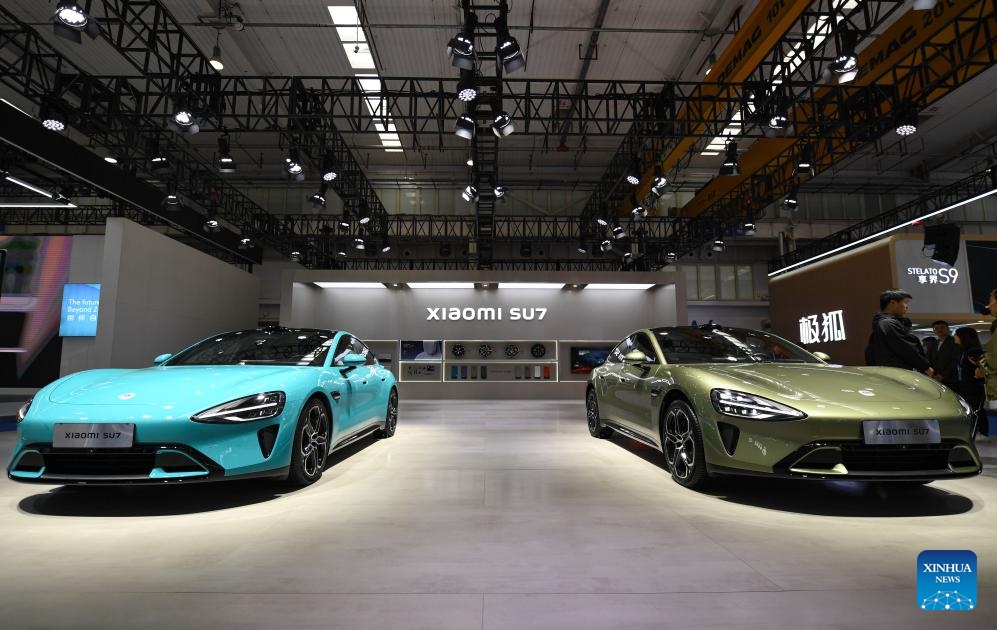
A recent fatal highway accident involving a Xiaomi SU7 electric vehicle (EV) has sparked debate on Chinese social media regarding the safety of smart driving, as the preliminary findings released by the company indicate that the vehicle was in NOA (navigation on autopilot) mode before the tragedy, though the cause of the accident remains undetermined.
On Tuesday, Chinese EV maker Xiaomi issued a statement acknowledging the accident on the Dezhou-Shangrao Expressway late on the night of March 29, which killed three people. The statement said that preliminary findings show the vehicle was in NOA-intelligent assisted driving mode.
Another statement issued by Xiaomi vehicle's official Sina Weibo account on Tuesday night also mentioned that local police arrived at the scene and are fully involved in investigating the accident, as the investigation is ongoing.
The incident has then attracted much attention from Chinese netizens about the safety of EVs, sparking discussions on topics such as the definition of "smart driving," autonomous emergency braking and safety of batteries, as well as calls for clearer marketing by auto sellers regarding smart driving features.
People argued that the potential risks associated with the technology should be clearly labeled and effectively communicated to the public. They emphasized that consumers need to exercise more caution when adopting such technology to protect themselves from unforeseen consequences.
A consumer surnamed Li, who has used the autonomous driving feature in his EV, told the Global Times that he only activates it during highway traffic jams or when he urgently needs to answer phone calls. Even then, he stays alert to road conditions, as the system cannot detect distant obstacles.
Li said that NOA is less practical for overtaking and lane changes, sometimes experiencing sudden deceleration.
According to China's vehicle driving automation classification standard, released in March 2022, automated driving is categorized into L0 to L5, corresponding to six levels of "emergency assistance, partial driving assistance, combined driving assistance, conditional autonomous driving, highly automated driving and fully automated driving, Xinhua Net reported.
L0-L2 is driver assistance, a low-level driving automation function, which assists a driver only to perform dynamic driving tasks. Currently, the operating level of EVs in China is generally under driver assistance, which underscores that automation remains an assistive driving feature rather than fully autonomous driving, Wu Shuocheng, a veteran automobile industry analyst, told the Global Times on Wednesday.
Wu noted that some manufacturers often use promotional languages that can mislead consumers to believe NOA equates to full automation, as the technology remains fundamentally as an assistive feature.
Although the cause of the accident has not been identified, the debate on smart driving safety continues to rage on social media. Wu pointed out that some consumers may place excessive trust in smart driving functions. While it is natural for consumers to have high expectations for new technologies, they should not rely on them excessively, the expert cautioned.
This is not the only incident. In 2016, a white Tesla sedan traveling on a highway's leftmost lane in North China's Hebei Province collided with a road sweeper performing maintenance. The driver was transported to two hospitals for emergency treatment but ultimately died due to severe injuries. After over a year of legal proceedings, Tesla acknowledged that the vehicle was in NOA mode at the time of the crash.
Wu added that policymakers in the automotive industry should implement stricter regulations on product specifications and safety standards.
Manufacturers should ensure that users are thoroughly educated on the proper use of autonomous driving features and emergency protocols during the vehicle handover process, he said.